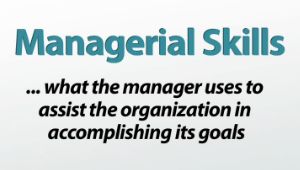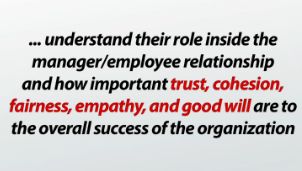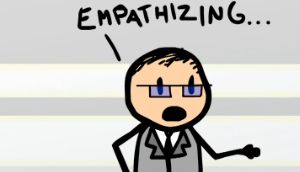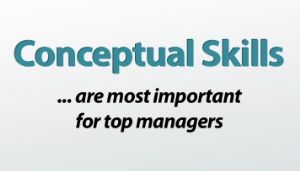Managerial Skills: How Good Managers Promote Productivity - Answers
The answers are in BOLD below.
NOTE: The transcript from the video is listed below the quiz for your reference.
1. Which skill helps a manager to communicate, lead, and motivate an employee to work towards higher level of productivity?
- Technical
- Human
- Conceptual
- Interpersonal
2. At what level are conceptual skills most important?
- Low-level management
- Top-level management
- Middle-level management
- High-level management
3. At what level are human skills important?
- Bottom-level management
- Middle-level management
- Top-level management
- All levels of management
4. The three skills that each manager needs are
- Technical, Human, and Conceptual
- Technical, Interpersonal, and Conceptual
- Technological, Interpersonal, and Strategic
- Technological, Human, and Conceptual
5. The set of unique abilities a manager must possess are referred to as
- Managerial traits
- Managerial abilities
- Managerial skills
- Managerial qualities
This lesson will discuss the types of skills a manager needs, including technical, human, and conceptual skills. You'll learn how each of these skill sets impacts a manager's ability to effectively lead his or her employees.
Managerial Skill Sets
Much like a professional basketball player needs to know how to dribble and shoot a basketball, or how a home builder understands the process of framing a house, managers also need to have a specific set of skills in order to effectively perform their jobs. Managerial skills are what the manager uses to assist the organization in accomplishing its goals. Specifically, a manager will make use of his or her own abilities, knowledge base, experiences, and perspectives to increase the productivity of those with whom they manage.
 |
The toolbox for what a manager needs in order to perform their job effectively, typically, fall into one of three categories: technical skills, human skills, and conceptual skills. To give you a better understanding of these skills, let's take a look at how each of these skills are applied by Manny the Manager and his employee Kelly the Financial Analyst.
Technical Skills
Technical skills are those skills needed to accomplish a specific task. It is the 'how to' skill set that allows a manager to complete his or her job. These skills are the combination of formal education, training, and on-the-job experience. Most employees expect their managers to have a technical skill set above their own so that, when needed, an employee can come to their manager to find out how to do something specific to their individual job.
For example, let's say that part of Kelly the Financial Analyst's job is to update a balance sheet each week. Kelly is a novice financial analyst and is new to the company, so she's expecting her manager, Manny, to show her how to perform this task initially, so that she can, eventually, do it on her own. Therefore, it is essential for Manny to have the technical skills of how to update a balance sheet so that he may, in turn, share that skill with Kelly. As a low-level manager, technical skills are most important for Manny due to how close his role is to the general workforce - in this case, Kelly.
Human Skills
The next type of skills a manager must have are human skills. These interpersonal skills are what a manager will use to work with his or her employees. Some people are born with good human skills; others must work much harder at it. Human skills are critical for all managers because they work with people. Managers with good human skills understand their role inside the manager/employee relationship and how important things, like trust, cohesion, fairness, empathy, and good will, are to the overall success of the organization. Human skills help the manager to communicate, lead, and motivate an employee to work towards a higher level of productivity.
 |
For example, let's go back to Kelly and Manny. Imagine Kelly's job description was changing to include a greater deal of responsibility but for the same pay. Kelly is upset, and feels overwhelmed by this change. Manny is a manager with good human skills, so he is able to empathize and communicate his understanding of Kelly's frustration with the change to her. Manny quickly works to find ways to motivate Kelly to continue to work at a higher level, despite the additional workload being placed on her.
 |
Conceptual Skills
Conceptual skills are the final type of skills a manager must possess inside their toolbox. The level of analytical ability to envision both the parts and its sum directly translates into a manager's conceptual skill set. Essentially, a manager's conceptual skills allow him or her to solve problems in a strategic and calculated fashion. Conceptual skills are becoming increasingly more important in today's chaotic business environment.
Managers are, continually, being challenged to think conceptually about their organizations to develop action plans and harness resources to achieve organizational goals. A manager with good conceptual skills can look at a problem, break it down into manageable pieces, consider a variety of possible solutions, all before putting it back together again in a more effective and efficient manner. Conceptual skills are most important for top managers but still important for middle and low-level managers as well.
 |
For Manny, using his conceptual skills might involve analyzing problems specific to his employees. Take, for example, Kelly's job changing. Before Manny can use his human skills to empathize with Kelly's situation, he must first also gather the facts so that he can provide a good rationale and action plan to her. This means that Manny must consider why this change is needed; who it will affect and in what manner; the greater good that it will serve; how new performance measures will be created and assessed for the additional responsibilities; what training will need to be provided so that Kelly can perform her new responsibilities well; and the best way to communicate the change to Kelly. Manny's conceptual skills help him to see all of these elements so that he can have a better understanding of the global impact it will have on his employee.
 |
Lesson Summary
Managerial skills are necessary for a manager to perform their job successfully. There are three different types of managerial skills, which include technical skills, human skills, and conceptual skills.
Technical skills are the specific skill set used to perform a particular job, such as writing a computer program, developing a budget, or analyzing sales trends. These skills are most important for low-level managers because of how closely they work with employees performing the actual job functions. Human skills include the ability for managers to work with, motivate, encourage, empathize, and communicate with their employees. These skills are important for all levels of management. Conceptual skills are the manager's ability to think analytically about the organization and how to most effectively accomplish its goals. These skills become increasingly more important the higher the management level.